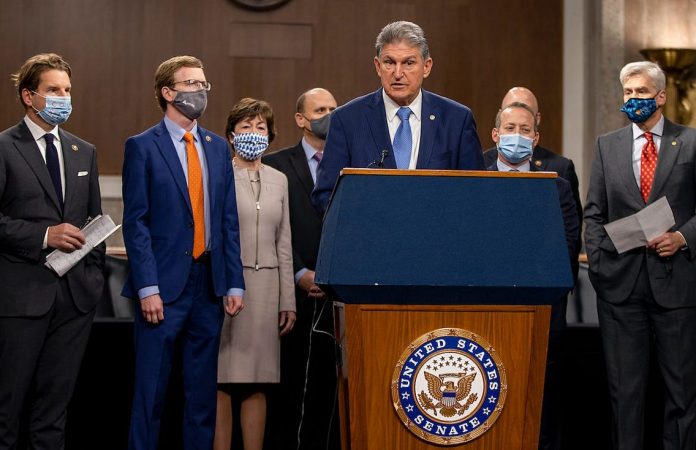A group of bipartisan legislators just unveiled a $908 billion coronavirus relief bill in hopes to end the feud between Democrats (mostly House Speaker Nancy Pelosi) and Republicans. Congress needs to sign off on approving funding legislation by Dec. 11 in order to avoid a government shutdown. Parties have fought tooth and nail over priorities and price tags for several months.
The plan was put together by members of the GOP-controlled Senate and Democratic-held House. Members such as Sens. Mitt Romney, Joe Manchin, Mark Warner, Fred Upton, Tom Reed, and several others presented the proposal to the Senate.
In the proposal’s framework, $288 billion goes to Paycheck Protection Program loans, $160 billion to state and local government relief, $16 billion into vaccine distribution, $82 billion into education, and $45 billion into transportation. It also includes $180 billion to fund a $200 per week supplemental unemployment benefit through March, which Democrats have opposed. They have pushed for a $600 per week supplemental jobless benefit instead.
The proposal does not include another round of direct payments but ensures that state and local governments get the millions of bail-out money they need to cover huge deficits prior to the crisis. President Trump has heavily opposed state and local government relief in the past. Blue cities and states have used the funds as a “get out of jail free” card to fund whatever they want.
Democrats aren’t too happy with the bill either. It offers temporary federal protection for small businesses from coronavirus-related lawsuits in the “short-term” which is a provision Democrats have opposed. Senate Majority Leader Mitch McConnell has noted liability protections as a priority in the next relief bill, even though Senate Democrats have shot down his offered relief bill twice.
“We just don’t have time to waste time,” said McConnell in response to the $908 billion plan on the table. The Senate GOP leader said a must-pass spending bill and pandemic relief provisions will come in one package put together by members of the Senate and House.
McConnell is proposing a slimmed-down version of the plan that still provides extension in unemployment programs, education funding, and liability shield from coronavirus-related lawsuits. The bill does not include additional federal unemployment benefits or aid for state and local governments.
Democrats and Republicans continue to fight over the size and composition of a second relief package. House Speaker Nancy Pelosi and Treasury Secretary Steven Mnuchin have been “in talks” over a second proposal for several months now, but have yet to bring anything into the public eye. Republicans have put several offers on the table, but Dems keep blocking relief to the American people.
“It seems like some of the major areas of disagreement are state and local financing, cost, unemployment benefit details, and the liability issue. Some of those can be bridged more easily than others,” said Brian Riedl, Manhattan Institute economist and policy expert.
Over the last few months, Pelosi has been known in the House for saying no. Whether it is price, policy, or something else, she’s got an excuse for it. She has been called out by Republicans AND members of her own party for blocking funds in the middle of a pandemic. People can’t feed their families when the government closes down “non-essential” shops every chance they get. Let the businesses open or provide relief. Doing neither just creates a crisis.


